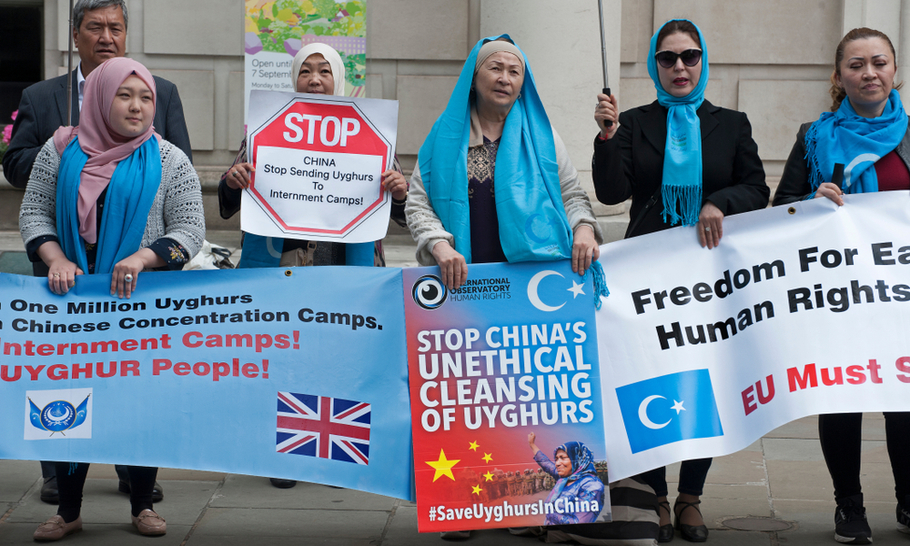China’s failed reputation

Protests in London (Shutterstock)
Angry Muslims march on the streets of Jakarta and Istanbul. Mesut Ozil, one of the world’s most famous Muslim soccer players, puts a flag of the Republic of East Turkestan (RET) on his website with a fierce critique: “Korans are being burnt. Mosques are being shut down. Religious scholars are being killed one by one . . . Muslims stay quiet.”
The anger has reached the Parliaments of Europe and the United States. Heiko Mass, Foreign Minister of Germany, told Die Ziet: “No company can ignore the fact that hundreds of thousands of Uighurs are being held in camps.”
The plight of the Uighurs in the western Chinese province of Xinjiang has become a global public relations nightmare for Beijing. Xinjiang covers 1.6 million square kilometres, one-sixth of the national land area. Its people converted to Islam in the ninth and tenth centuries AD. It was conquered by the Qing dynasty in the 18th century.
The Republic of East Turkistan is an independent state some Uighurs want to create in Xinjiang, alongside Kazakhstan, Turkmenistan and other countries established after the end of the Soviet Union in 1991. China was always seen as a friend of the Islamic world and escaped criticism from Muslims. But now, China appears anti-Muslim, a label it has fought hard to avoid.
Since 1949, the Chinese government has implemented a carefully planned strategy to Sinicise Xinjiang, just as it has done to Inner Mongolia and the Manchurian region in the northeast, and to Tibet. They all now have large Han Chinese majorities and very few people speak indigenous languages.
Between 1949 and 2008, the proportion of Han Chinese in Xinjiang rose from 6.7 per cent, 200,000, to 40 per cent, 8.4 million. Han now account for a majority in the northern half of the region, which is more economically developed.
For 20 years, the Uighur diaspora, mainly based in Turkey and Germany, lobbied against what it called this “colonisation” of Xinjiang. But it found no audience in the western corridors of power. Whereas the Tibetans have the Dalai Lama and Taiwan has Ma Ying-jeout, Xingjiang has no charismatic leader. In addition, western economies, hobbled after the 2008 financial crisis, came to rely on the giant Chinese manufacturing base, as well as on the diplomatic support of Beijing.
Then two things changed. First came the anti-China policy of President Donald Trump, who wants to decouple the US economy from China and who has eagerly adopted hostile trade and other policies.
The second is the revelation of vast, organised “training and re-education camps” in which the Chinese government has forcibly detained hundreds of thousands of Uighurs, without judicial process.
At the end of November, newspapers around the world published the China Cables, a cache of classified documents, which set out in detail the structure, daily life and ideological basis for the camps. They were leaked by a person or persons within the government who were angry with the camps or who wanted to attack President Xi Jinping. Beijing said the documents were “fabricated”.
These documents have caused an international outcry, even in Muslim countries that had previously declined to criticise Beijing. While the governments of these countries remain reluctant to attack a major source of trade deals, investment and capital, their citizens have started to find their voice, to speak up for their “Muslim brothers”.
In response, China has launched an unprecedented public relations offensive, with statements, videos and ambassadors holding news conferences.
They argue that China is doing no more than other countries in the face of terrorism. “The evil deeds of terrorists in Xinjiang are no secret to the world,” said an editorial in the China Daily on December 16. “As early as 2012, the so-called Eastern Turkestan Islamic Movement, which has planned the majority of the above-mentioned terrorist attacks, was officially recognised by the United Nations as a terrorist group.”
China says that its improved security measures have prevented attacks in Xinjiang since 2014 and made the region safe and that, in the camps, the Uighurs learn Mandarin, Chinese law and the constitution.
“All the students in the centres studying the national common language, law, vocational skills and de-radicalisation courses have graduated,” Shohrat Zakir, Xinjiang’s governor and number two official, told a news conference in Beijing on December 9. He provided no numbers or other supporting evidence and did not say if any “graduates” had been released.
He dismissed claims that one or two million people had been held in the detention centres as “groundless fabrications,” without providing numbers of his own.
Foreign companies with investments in Xinjiang are, for the first time, coming under pressure to withdraw their capital. “European companies cannot continue business in China and Xinjiang as if nothing is happening,” said Katrin Goring-Eckhardt, leader of the Greens in the German Parliament. “If they cannot guarantee their values in Xinjiang, it is time to disinvest.”
An official of a European multinational with a factory in the province said that the company had always justified its presence there on the basis that the plant provided employment and revenue to the local economy. “That answer is not good enough now,” he said.




